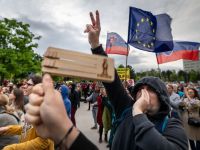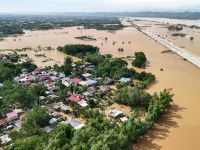In a sudden lull, the Middle East looked to Yasser Arafat Tuesday to act on his pledges to prevent more Palestinian attacks on Israel or face efforts by Israeli Prime Minister Ariel Sharon to sideline him completely.
Israeli Foreign Minister Shimon Peres said the Palestinian president should be given a few days to crack down on extremist groups who have said they will defy his demand for a cease-fire.
Arafat and the hard-line groups he accused of giving Israel a pretext to up military operations are at loggerheads over how to achieve the common goal of ending Israel's occupation of large swathes of Palestinian land.
The veteran Palestinian leader said in a key national address Sunday there must be a cease-fire to allow a return to political talks.
Radical Islamic groups, led by Hamas, dismissed the call, arguing that such a move would allow Israel's right-wing government to push ahead with a "campaign of extermination" against the Palestinian people.
There was a marked drop in violence following Arafat's televised speech, described by a UN envoy to the region as a "potential turning point" in the 14-month Palestinian uprising that has killed more than 1,100 people.
But Israeli forces still gunned down three Palestinians on Monday, including a 12-year-old child and a member of Hamas who tried to flee an army raid on his West Bank home.
Arafat accused Israel of escalating its military operations in response to his peace call and ignoring the progress he had made on the ground.
The Israeli press said the rules governing the army's conduct in the conflict had been loosened, allowing soldiers to fire on armed Palestinians on sight, even if they were not themselves shot at.
Arafat has been under massive pressure, both from the world community and from crushing Israeli air raids on his security infrastructure, to jail Islamic extremists behind a spate of bloody suicide bombings this month.
While his address Sunday received a positive reaction from the European Union -- whose 15 consuls visited him Monday in the West Bank town of Ramallah, in an open rebuff to Sharon's declaration that he is "irrelevant" -- Israel and the United States have said he must do more.
Four Israelis have been slightly injured in three separate shootings in the West Bank since his speech, in acts of defiance by hard-liners that intensified pressure on Arafat to face them down or invite further Israeli raids.
Sharon said if Arafat will not assure security in the areas under his control, Israel will not hesitate to send in tanks and helicopters to enforce its own brand of justice, which has included dozens of targeted killings of suspected militants.
But one of Arafat's top security officials, Colonel Mohammed Dahlan, said concrete measures would be used to enforce the cease-fire.
He said the move was not made to please Israel but to "demonstrate that the Palestinian Authority is the sole sovereign power".
However, Israeli army chief General Shaul Mofaz charged that the Palestinians had not renounced violence as a "strategic" means of achieving their goals.
Arafat's speech was hailed by Egypt and Jordan, the only Arab states to have made peace with Israel, but condemned in other quarters of the Arab world.
The Syrian press, without referring to the speech, called for the Palestinian uprising to go on, while the Saudi newspaper Al Watan slammed Arafat's words as "unconditional surrender" to Israel.
Israeli analysts say US support is swinging more and more behind Israel in the wake of Washington's successful campaign in Afghanistan, for which many Arab states expressed only lukewarm support.
Both Israel and the Palestinians tried to use the "war on terrorism" to tarnish the other's name, but a wave of devastating suicide bombings by Hamas brought unequivocal demands from Washington and Brussels for Arafat to crack down on "terrorism."
There were signs of mounting concern in the Arab world at the flare-up of violence in the wake of the Hamas attacks and the pressure that the Islamists -- the main Palestinian opposition -- had put on Arafat.
Iraqi President Saddam Hussein called for an emergency meeting of Arab heads of state "devoted to Israel's aggression against the Palestinians."
Foreign ministers of Arab League member states are also due to hold an extraordinary meeting in Cairo on Thursday to discuss the situation, although some officials said the meeting might be scrapped amid dissension over whether to condemn or condone Arafat's approach -- AFP
© 2001 Al Bawaba (www.albawaba.com)







